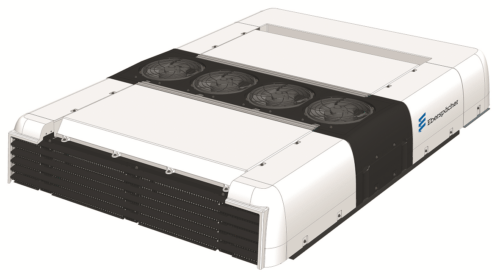
Reduced complexity through heat pump technology with airflow reversal, integrated exhaust air function for heat recovery and natural refrigerant CO₂ as standard mark out the latest product from Eberspaecher. With its new AC138 EVO platform, Eberspaecher is expanding its product portfolio with a roof-mounted system especially designed for hybrid and battery electric buses, which the manufacturer says offers low complexity and high energy efficiency.
The AC138 EVO achieves low power consumption when heating and cooling thanks to the heat pump technology patented by Eberspaecher, which the firm explains works by reversing the air circuit instead of the refrigerant circuit and therefore simplifies the latter considerably. This enables the refrigerant system components to be optimised for just one function at a time, increasing their efficiency. All the complexity is handled by the software, which regulates the air flaps. An overall weight reduction of up to 50kg is achieved, and the integrated exhaust air function allows energy recovery from the outflowing air. Independent control of the air flaps ensures optimal temperature regulation in the passenger compartment by mixing the ambient and interior air.
Eberspaecher will introduce the system first with natural climate-friendly refrigerant CO2, R744, which it says is much more environmentally friendly and safer than chemical alternatives. With a Global Warming Potential (GWP) value of 1, Eberspaecher says it has the lowest greenhouse potential used in bus thermal management, whilst in contrast to other natural refrigerants, R744 is neither flammable nor toxic. In the future, other refrigerants, such as propane in direct evaporation, are planned.
Eberspaecher offers the system in two different sizes for different applications. A variant for coaches has a low height of 250mm and an aerodynamic design. A more compact version for city buses has a height of 415mm and a shortened length of 2.8m. Both have 35kW cooling and 24kW heat output and weigh 325kg.
The AC138 EVO will go into series production and be installed in the all-electric city bus of a well-known manufacturer from 2025. The thermal management system is also suitable for vehicles with combustion engines without an electric drive module.

